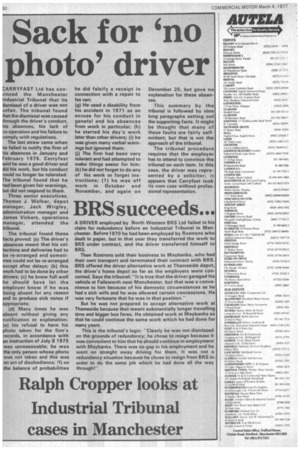Sack for 'no photo' driver
Page 66

If you've noticed an error in this article please click here to report it so we can fix it.
CARRYFAST Ltd has convinced the Manchester Industrial Tribunal that its iismissal of a driver was not Anfair. The tribunal found that the dismissal was caused through the driver's conduct, his absences, his lack of co-operation and his failure to comply with regulations.
The last straw came when he failed to notify the firm of his absences in January and February 1976. Carryfast said he was a good driver and lid his work, but his conduct could no longer be tolerated. the tribunal found that he had been given fair warnings, but did not respond to them.
Three senior executives, Thomas J. Walker, depot manager, Jack Wrigley, administration manager and James Vickers, operations manager, attended the tribunal.
The tribunal found these facts proved: (a) The driver's absences meant that his collections and deliveries had to be re-arranged and sometimes could not be re-arranged except after delays; (b) this work had to be done by other drivers; (c) he knew full well he should have let the employer know if he was being absent for any reason and to produce sick notes if appropriate;
(d) Many times he was absent without giving any notification or explanation; (e) his refusal to have his photo taken for the firm's records, in accordance with an instruction of July 8 1975 was unreasonable; he was the only person whose photo was not taken and this was an act of disobedience; ¶f) on the balance of probabilities he did falsify a receipt in connection with a repair to his van; (g) He used a disability from his accident in 1971 as an excuse for his conduct in general and his absences from work in particular; (h) he started his day's work later than other drivers; (i) he was given many verbal warnings but ignored them; 6) The firm had been very tolerant and had attempted to make things easier for him; (k) he did not forget to do any of his work or forget instructions; (1) he was off work in October and November, and again on December 20, but gave no explanation for these absences.
This summary by the tribunal is followed by nine long paragraphs setting out the supporting facts. It might be thought that many of these faults are fairly selfevident; but that is not the approach of the tribunal.
The tribunal procedure requires that the employer has to attend to convince the tribunal on each item. In this case, the driver was represented by a solicitor; it appears that Carryfast took its own case without professional representation.


























































































































































